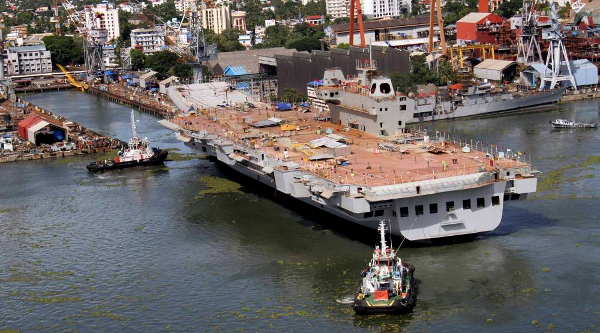NEW DELHI: The manufacturing of the country’s first indigenous aircraft carrier Vikrant is currently under phase three which involves setting to work of machinery and other equipment and it is likely to be commissioned by early 2021, sources said on Wednesday.
The nearly 40,000-tonne carrier is being built at the Cochin Shipyard Limited (CSL) in Kochi.
“Currently, phase three of the construction of Vikrant is under progress, which involves setting to work of machinery and equipment, like power generation and propulsion machinery. The carrier is likely to be commissioned by early 2021,” a source told PTI.
The third phase of construction will go on till acceptance of harbour and sea trials, sources added.
Aviation trials would also take a year or so after that, they said.
Navy Chief Admiral Karambir Singh on December 3 had said that Vikrant will be fully operational by 2022 and it will have a fleet of MiG-29K aircraft.
The first indigenous aircraft carrier Vikrant along with MiG-29K aircraft will be showcased as part of the Navy’s tableau during the ceremonial parade on Rajpath on Republic Day, officials said.
“This not only depicts the strength of the Indian Navy but is representative of the Navy’s total commitment to the Make in India initiative of the government,” the official said.
The basic design of the indigenous aircraft carrier was done by the Indian Navy’s Directorate of Naval Design and was developed into a detailed one by the design team of CSL.
The ship has a length of over 260 m and breadth of 60 m. It has two take-off runways and a landing strip with three arrester wires, capable of operating STOBAR aircraft including the indigenous LCA, as well as a range of helicopters with hangar facilities, officials had earlier said.
Source: ET
Image Courtesy: Wikimedia
You may also like
-
IAF Aircraft Set Course For Exercise Eastern Bridge VII At Oman
-
IAF Set To Host The Indian Defence Aviation Exposition-II At Jodhpur
-
Defence Secretary to co-chair 5th India-Philippines Joint Defence Cooperation Committee meeting in Manila
-
Simultaneous Launch Of ‘malpe And Mulki’, Fourth And Fifth Ships Of Asw Swc (Csl) Project
-
Aatmanirbharta in Defence: MoD signs Contract with HAL for 240 AL-31FP Aero Engines for Su-30MKI Aircraft
